- Home
- Roger Zelazny
Doorways in the Sand Page 17
Doorways in the Sand Read online
Page 17
The incision in my left arm stung a bit but was not especially painful. Ragma had wanted to avoid the introduction of additional chemicals of unknown effect to the area, which was understandable, and I was partially successful in setting up a biofeedback block. So my bared left arm rested on a previously white hotel towel, which I was brightening and darkening here and there beneath the area where he had swabbed alcohol, slashed me and applied more alcohol. I was resting in a swivel chair belonging to one of the guards we had relieved, trying not to think about the eviction of the star-stone from my premises. It was taking place, all right. I could tell that from the expressions on Paul’s and Nadler’s faces.
Situated right beside the base of the Rhennius machine, M’mrm’mlrr swayed and concentrated—or whatever he did—to cause what was taking place to take place. A bit of moon showed through the skylight. The hall echoed the least sound and was cold as a tomb.
I was not really certain that what was being done was the right thing. On the other hand, I could not be sure that it was not. It was not the same thing as doublecrossing a friend or betraying a confidence, or anything like that, both because my guest had been of the uninvited variety and because I had given him what he was after—viz., namely & to wit, I had turned him on.
Still, though, echoing up from the chambers of my memory came the thought that he had given me the legal citation I had needed back when I was searching for something to keep them from spiriting me away. And he had put my chest together again. And he had promised to clarify everything, eventually.
But my metabolism meant a lot to me, and that spell on the bus and my experience of being controlled back in the hospital were also distressing. I had made my decision. Second thoughts were now a waste of time and emotion. I waited.
Our Snark is a Boojum!
There it was again, desperate-sounding this time, followed by the superimposition of massive teeth framed by upward curving lips on the far wall. Then fading, fading . . . Gone.
“We have him!” said Ragma, slapping a pad of gauze onto my arm. “Hold that in place for a while.”
“Right.”
It was only then that I ventured a look.
The star-stone was there on the towel. Not quite as I remembered it, for its shape was somewhat altered and its colors seemed more vivid—near to pulsing.
Our Snark is a Boojum. Anything from a distorted appeal for reconsideration to a euphemistic warning to a wasp concerning certain flowers—distorted as it was by the handedness barrier. I would have given a lot just then to know, though.
“What are you going to do with it now?” I asked.
“Get it to a safe place,” Ragma said, “after you’ve taken your little turnabout. Then it will be up to your United Nations for a time, since they are its current custodians. Still, a report on this new finding will have to be circulated among all our member worlds, and I would imagine your authorities will want to act under their advisement as to tests and observations that might now be in order.”
“I’d imagine,” I said, and he reached to pick it up.
“There’s a good little fellow” came an all too familiar voice from across the hall. “Gingerly, gingerly now! Wrap it in the towel, please. I’d hate to have it chipped or scratched.”
Zeemeister and Buckler had entered the hall, carrying guns, pointing them. Jamie, who was grinning, remained near the entrance, covering it. Morton, who looked pretty pleased himself, advanced on us.
“So that’s how you hid it, Fred,” he observed. “Neat trick.”
I said nothing but rose slowly to my feet, nothing in mind but the fact that I could move faster from that position.
He shook his head.
“No need for trouble,” he said. “This time you are safe, Fred. Everyone here is safe. So long as I get the stone.”
I wondered, in a hopefully telepathic fashion, whether M’mrm’mlrr might reach out and burn his brain as a contribution to domestic tranquillity.
The suggestion was apparently accepted just as he came up beside me and hefted the stone. For he shrieked then and suffered a minor convulsion.
I grabbed for the gun with both hands. Jamie was far enough away to give me sporting odds on the attempt. I did not think he would take a chance on hitting his boss.
The pistol was fired twice before I tore it away from him. I did not get to keep it, however, as he jabbed me in the belly and caught me with an uppercut that knocked me to the floor. The weapon went spinning and skidding away to a place somewhere beneath the platform of the Rhennius machine.
Zeemeister kicked Ragma, who had chosen that moment to attack, away from him. Still clutching the stone, he produced a long, shiny blade from somewhere in the vicinity of his forearm. Then he shouted to Jamie but stopped in mid-cry.
I looked to see what had happened and decided that it must be another hallucination.
Jamie’s weapon lay half a dozen paces behind him, and he stood rubbing his wrist, facing the man with the neat beard and the amused expression, the man who held one hand in his pocket and twirled a shillelagh with the other.
“I’ll kill you,” I heard Jamie say.
“No, Jamie! No!” Zeemeister cried. “Don’t go near him, Jamie! Run!”
Zeemeister backed away, pausing only to slash one of M’mrm’mlrr’s tentacles, as if knowing the source of his mental anguish.
“He’s not much,” Jamie called back.
“That’s Captain Al!” Zeemeister shouted. “Run, you fool!”
But Jamie decided to swing instead.
It was instructive to almost behold. “Almost,” I say, because the cudgel moved a bit too fast for me to trace its passage. So I was not certain exactly where or how many times it touched him. It seemed only an instant after Jamie began his swing that he was falling.
Then, still twirling the stick, casually, Jauntily now, the hallucination moved past Jamie’s crumpled form and headed on toward Zeemeister.
Not taking his eyes from the advancing figure, Zeemeister continued to retreat, holding the knife low before him, edge upward.
“I thought you were dead,” he finally said.
“Obviously you were mistaken” came the reply.
“What interest have you in this thing, anyway?”
“You tried to kill Fred Cassidy,” he said, “and I’ve invested a lot in that boy’s education.”
“I did not associate the name,” Zeemeister replied. “But I never really intended to harm him.”
“That is not the way that I heard it.”
Zeemeister continued to back away, passing through the gate in the guardrail, moving until the rotating platform of the Rhennius machine brushed the backs of his pant legs. He spun then and slashed at Charv, who was passing by, brandishing a wrench. Charv bleated and fled the platform, dropping to the floor near M’mrm’mlrr and Nadler.
“What are you going to do, Al?” Zeemeister inquired, turning back to face the other.
But there was no reply, only a continued advance, a continued twirling of the club, a smile.
At the last instant, before he came into shillelagh range, Zeemeister bolted. Raising one foot to the platform, he sprang back on it, turning, and rushed forward all of two paces. Its rotation, however, had so positioned the apparatus that he collided with the central unit, which faintly resembled a wide hand cupped as in the act of scratching.
His momentum and angle of incidence were such that his stumbling rebound bore him down atop the belt. His knife and the towel-swathed star-stone flew from his hands as he tried to stay his fall. They bounced from the platform down onto the floor as he was borne on into the tunnel. His scream was cut short with an ominous abruptness and I looked away, but not in time.
It apparently turned him inside out.
Which of course delivered the contents of his circulatory and digestive systems to the floor.
Also, it seemed to have inverted all of the organs which were now exposed.
The contents of my own stomach
sought egress, reinforced by the noises which had begun about me. Like I said, I looked away. But not in time.
It was Charv who finally managed to get up stomach enough to get to them and throw someone’s coat over the remains, where they had fallen from the belt as it advanced toward the perpendicular. Then, and only then, did Ragma’s practicality return, punctuated by his near hysterical “The stone! Where is the stone?”
Through watering eyes, I sought for it and then beheld the racing form of Paul Byler, bloody towel clutched beneath his arm, on his way across the hall.
“Once a jolly swagman,” he called out, “always a jolly swagman!” and he was gone out the door.
Pandemonium reigned. Over the just and the near just.
My hallucination then gave a final spin to his stick, turned, nodded in my direction and approached us. I rose to my feet, nodded back, found a smile and showed it to him.
“Fred, my boy, you’ve grown,” he said. “I hear you have acquired a high degree and a responsible position. Congratulations!”
“Thank you,” I said.
“How are you feeling?”
“Rather like Pip,” I told him, “though my expectations are simple things, I never realized what your export-import business was actually all about.”
He chuckled. He embraced me.
“Tut, lad. Tut,” he said, pushing me back to arm’s length again. “Let me look at you. There. So that’s how you turned out, is it? Could be worse, could be worse.”
“Byler has the stone!” Charv shrieked.
“The man who just left—” I began.
“—shan’t get very far, lad. Frenchy is outside to prevent anyone’s departing this place with unseemly haste. In fact, if you listen you may hear the clatter of hooves on marble.”
I did, and I did. I also heard profanity and the sounds of a struggle without.
“Who, sir, are you?” Ragma inquired, rising up onto his hind legs and drawing near.
“This is my Uncle Albert,” I said, “the man who put me through school: Albert Cassidy.”
Uncle Albert studied Ragma through narrowed eyes as I explained, “This is Ragma. He is an alien cop in disguise. His partner is named Charv. He is the kangaroo.”
Uncle Al nodded.
“The art of disguise has come a long way,” he observed. “How do you manage the effect?”
“We are extraterrestrial aliens,” Ragma explained.
“Oh, that does make a difference then. You will have to excuse my ignorance of these matters. For a number of years and a variety of reasons have I been a man whose very blood is snow-broth, numb to the wanton stings and motions of the senses. Are you a friend of Fred’s?”
“I have tried to be,” Ragma replied.
“It is good to know that,” he said, smiling. “For, extraterrestrial alien or no, if you were here to harm him, not all the cheese in Cheshire would buy your safety. Fred, what of these others?”
But I did not answer him because I had chosen that moment to glance upward, had seen something just as he had spoken and was in the process of having the 1812 Overture, smoke signals, semaphores and assorted fireworks displays simultaneously active within my head.
“The smile!” I cried and tore off toward the rear of the hall.
I had never been past the door at that end of the place, but I was familiar with the reversed layout of the roof and that was all that I needed to know just then.
I plunged through and followed the corridor that lay behind. When it branched, I headed to the left. Ten quick paces, another turn and I saw the stairway off to the right. Reaching it, I swung around the rail post and took the steps two at a time.
How it all fit I did not know. But that it did I did not doubt.
I reached a landing, took a turn, came to another, took another. The end of things came into view.
There was a final landing with a door at the head of the stairs, all enclosed in a kiosk with small, meshed windows about. I hoped that the door opened from the inside without a key—it looked like that sort of handle arrangement—because it would take a while to smash through a window and its grillwork, if I could do it at all. As I ascended, I cast my eyes about, looking for tools for this purpose.
I spotted some junk that might serve that end, as no one had apparently envisioned anyone wanting to break out of the place. It proved unnecessary, however, for the door yielded when I depressed the handle and threw my weight against it.
It was of the heavy, slow-opening sort, but when I had finally thrust it aside and stepped out I was certain that I was near to something important. I blinked against the darkness, trying to sort pipes, stacks, hatch covers and shadows into the notches my memory provided. Somewhere among them all, beneath the stars, the moon and the Manhattan skyline, was one special slot that I had to fill. The odds might be against it, but I had moved quickly. If the entire guess held true, there was a chance . . .
Catching my breath, I studied the panorama. I circled the kiosk slowly, my back to it, staring outward, scrutinizing every dark patch and cranny on the roof, on the ledges, beyond. It was almost a literally proverbial situation, only this was not a coal cellar and it was past midnight.
The object of my search might seem to have several advantages. Along with a growing certainty that I was right, however, I had persistence. I would not go away. I would outwait him if he were waiting. I would pursue him if I glimpsed his flight.
“I know you are there,” I said, “and I know that you can hear me. There must be an accounting now, for we have been pushed too far. I have come for it. Will you surrender yourself and answer our questions? Or do you wish to make a bad situation worse by being difficult about it?”
There came no answer. I still had not caught sight of what I had hoped to find.
“Well?” I said. “I am waiting. I can wait as long as is necessary. You have to be breaking the law—your law. I am positive of that. The nature of the entire setup requires injunctions against activities of this sort. I have no idea as to your motives, but they are not especially material at this point. I suppose that I should have caught on sooner, but I did not extend my recent awareness of the diversity of alien life forms quite quickly enough. So you got away with a lot. Back at the shack? Yes, I guess that is where I should have made the connection, the second time around. There were a few earlier encounters, but I think I may be excused missing their significance. Right here even, the night I tested the machine . . . Are you ready to come out? No? All right. My guess is that you are telepathic and that all these words are unnecessary, as I did not hear you say anything to Zeemeister. Still, I am not of a mind to settle for anything less than certainty, so I shall continue in this fashion. I believe you possess a tapetum, like your model. I saw the light from below. Keep your eyes closed or your head turned away, or I’ll spot the light. Then, of course, you will not be able to see me. Your telepathic sense, though? I wonder now. It just occurred to me that you might betray yourself to M’mrm’mlrr if you use it. He isn’t all that far away. It is possible that you are now at a disadvantage. What do you say? Do you want to be graceful about it? Or would you rather sit out a long siege?”
Still nothing. But I refused to let a doubt enter my mind.
“Stubborn, aren’t you?” I went on. “But then I would imagine you have a lot to lose. Ragma and Charv seem to have a bit of leeway in their work, though, being this far from the center of things. Perhaps they know some way to make it go a trifle easier for you. I don’t know. Just talking. Worth thinking about, though. I believe the fact that no one has followed me up here indicates that M’mrm’mlrr is reading my thoughts and reporting the situation below. They must already be aware of everything that I have figured out. They must know that what tripped you up was no fault of your own. I do not believe that you or anyone else realized until just recently that the star-stone was sentient and that when I switched it on it began recording data, tabulating it, processing it. It had a rough time because of the handedness
barrier which still persisted, though, because what turned it on pretty much turned me off—for purposes of communicating with it. So it could not simply come out and deliver its conclusions concerning yourself. It gave me a line from Lewis Carroll, though. Maybe it picked it up back in the bookstore. I don’t know. It has had twisted versions of all my memories to play with, too. Wherever it got it, it did not click for me. Even though it was the second such attempt. The smile came first. Nothing there for me either. Not until Uncle Albert said ‘Cheshire’ and I looked up and saw the outline of a cat against the moon, above the skylight. You dumped all that fishing gear on Paul Byler. Zeemeister was your creature. You needed human agents, and he was the perfect choice: venal, criminally competent and knowledgeable of the situation from the beginning. You bought him and sent him after the stone. Only the stone had other ideas, and at the last minute I caught them. You are in the form of a black cat who has crossed my path one time too many. Now I am thinking that if there are any lights up here, someone down below ought to go looking for the switchbox. Maybe they are already on their way to it. Shall we go below or wait for them? I’ll nail you once they come on.”
Despite the fact that I thought myself prepared for anything, I was taken by surprise in the next instant. I screamed when it hit, and I tried to protect my eyes. What a fool I had been!
I had looked everywhere but on top of the kiosk.
Claws dug into my scalp, scratched at my face. I tore at the creature but could not get a hold that would dislodge it. Desperately, then, I threw my head back toward the wall of the kiosk.
Predictably—by hindsight—it leaped away just as I did this and I brained myself against the wall.
Cursing, staggering, holding my head, I was unable for the moment to pursue the thing. Several moments, in fact . . .
Straightening finally, wiping the blood from my forehead and cheeks, I looked for it again. This time I caught the movement. It was bounding toward the edge of the roof, it was up onto the low guard wall . . .
It paused there. It glanced back. Mocking me? I caught the flash from those eyes.
“You’ve had it,” I said, and started forward.

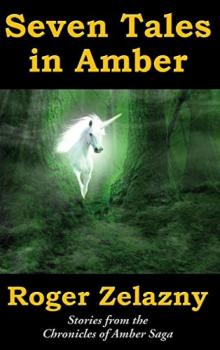 Seven Tales in Amber
Seven Tales in Amber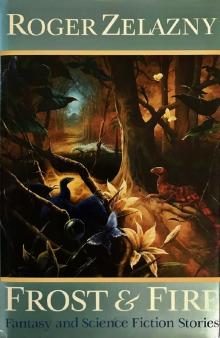 Frost and Fire
Frost and Fire Doorways in the Sand
Doorways in the Sand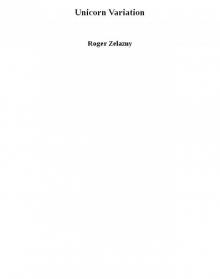 Unicorn Variation
Unicorn Variation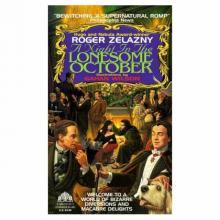 A Night in the Lonesome October
A Night in the Lonesome October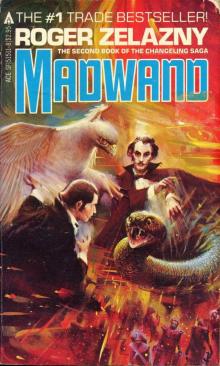 Madwand
Madwand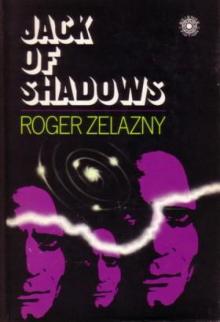 Jack Of Shadows
Jack Of Shadows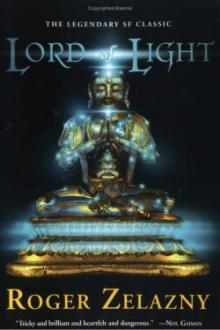 Lord of Light
Lord of Light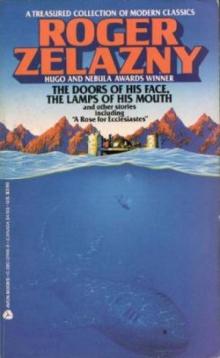 The Doors of His Face, The Lamps of His Mouth and Other Stories
The Doors of His Face, The Lamps of His Mouth and Other Stories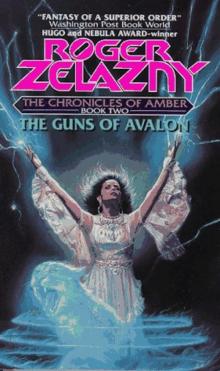 Guns Of Avalon tcoa-2
Guns Of Avalon tcoa-2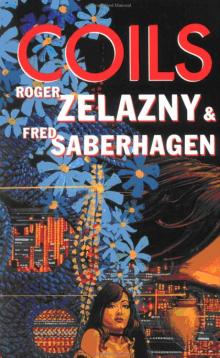 Coils
Coils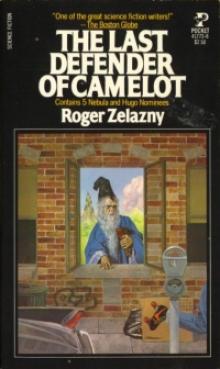 The Last Defender Of Camelot
The Last Defender Of Camelot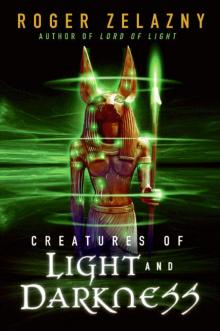 Creatures of Light and Darkness
Creatures of Light and Darkness This Immortal
This Immortal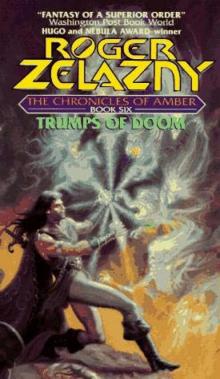 Trumps of doom tcoa-6
Trumps of doom tcoa-6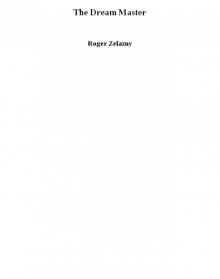 The Dream Master
The Dream Master The Complete Dilvish, The Damned
The Complete Dilvish, The Damned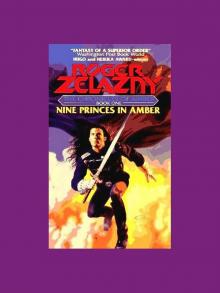 Nine Princes in Amber
Nine Princes in Amber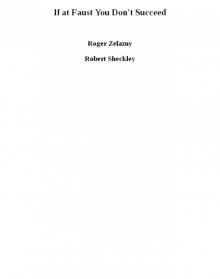 If at Faust You Don't Succeed
If at Faust You Don't Succeed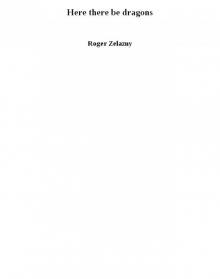 Here there be dragons
Here there be dragons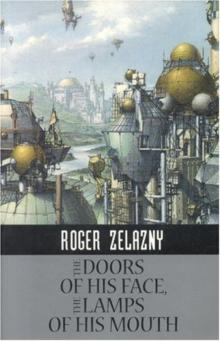 The Doors Of His Face, The Lamps Of His Mouth
The Doors Of His Face, The Lamps Of His Mouth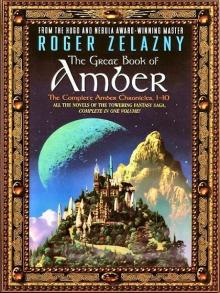 The Great Book of Amber - Chronicles 1-10
The Great Book of Amber - Chronicles 1-10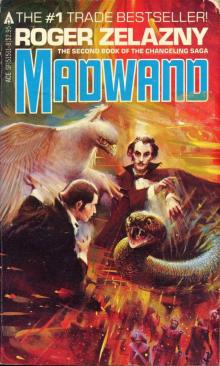 Madwand (Illustrated)
Madwand (Illustrated)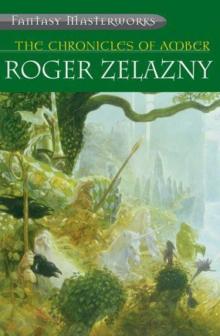 The Chronicles of Amber
The Chronicles of Amber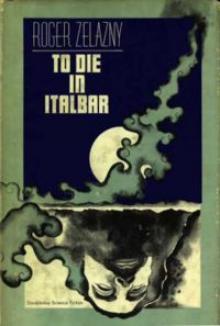 To Die In Italbar
To Die In Italbar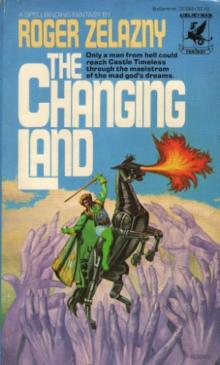 The Changing Land
The Changing Land The Furies
The Furies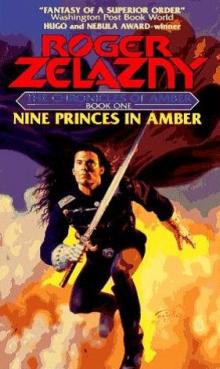 Nine Princes In Amber tcoa-1
Nine Princes In Amber tcoa-1 Last Of The Wild Ones
Last Of The Wild Ones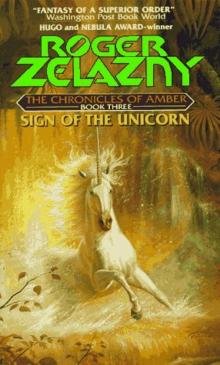 Sign of the Unicorn tcoa-3
Sign of the Unicorn tcoa-3 My Name is Legion
My Name is Legion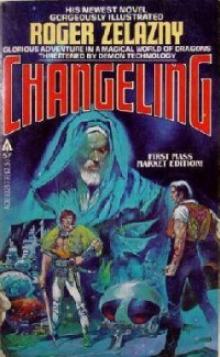 Wizard World 1: Changeling
Wizard World 1: Changeling Changeling
Changeling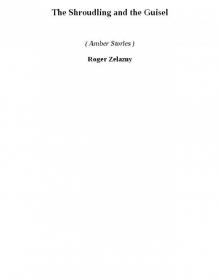 The Shroudling and the Guisel (amber stories)
The Shroudling and the Guisel (amber stories)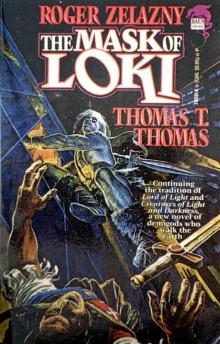 The Mask of Loki
The Mask of Loki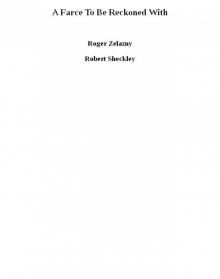 A Farce To Be Reckoned With
A Farce To Be Reckoned With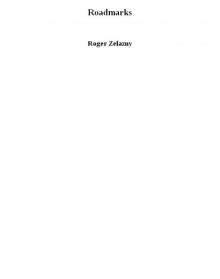 Roadmarks
Roadmarks When Pussywillows Last in the Catyard Bloomed (rtf)
When Pussywillows Last in the Catyard Bloomed (rtf)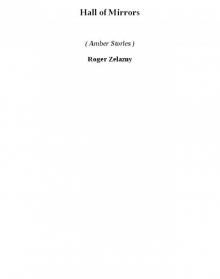 Hall of Mirrors (amber stories)
Hall of Mirrors (amber stories) Permafrost
Permafrost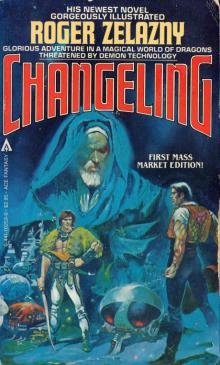 Changeling (Illustrated)
Changeling (Illustrated)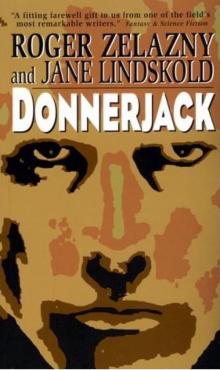 Donnerjack
Donnerjack Shadows & Reflections: A Roger Zelazny Tribute Anthology
Shadows & Reflections: A Roger Zelazny Tribute Anthology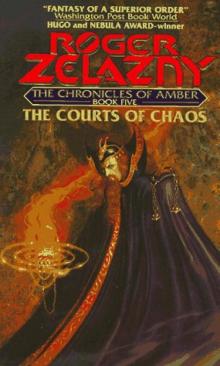 The Courts Of Chaos tcoa-5
The Courts Of Chaos tcoa-5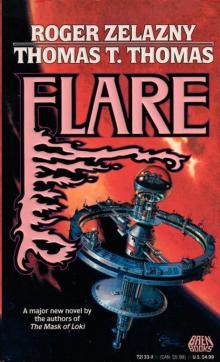 Flare
Flare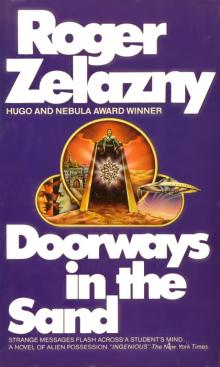 Doorsways in the Sand
Doorsways in the Sand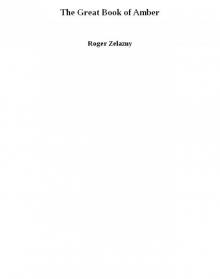 The Great Book of Amber
The Great Book of Amber Home Is the Hangman
Home Is the Hangman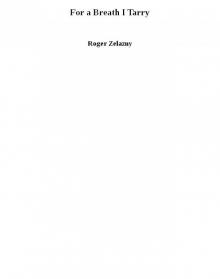 For a Breath I Tarry
For a Breath I Tarry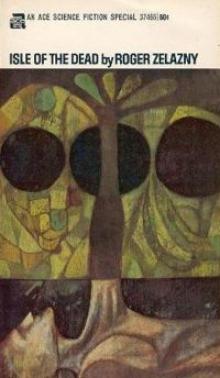 Isle Of The Dead
Isle Of The Dead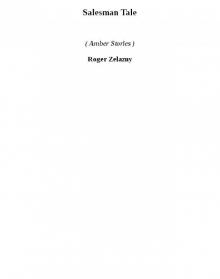 Salesman Tale (amber stories)
Salesman Tale (amber stories) Dismal Light
Dismal Light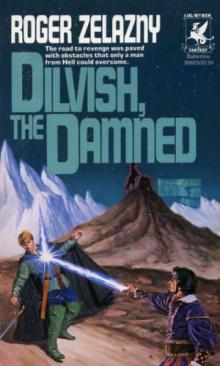 Dilvish, The Damned
Dilvish, The Damned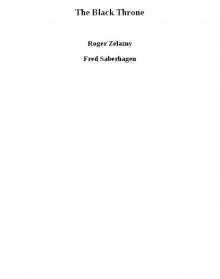 The Black Throne
The Black Throne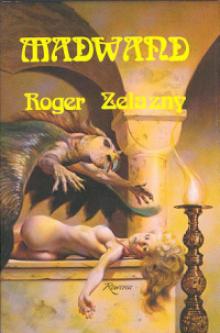 Wizard World 2: Madwand
Wizard World 2: Madwand The Salesman's Tale
The Salesman's Tale